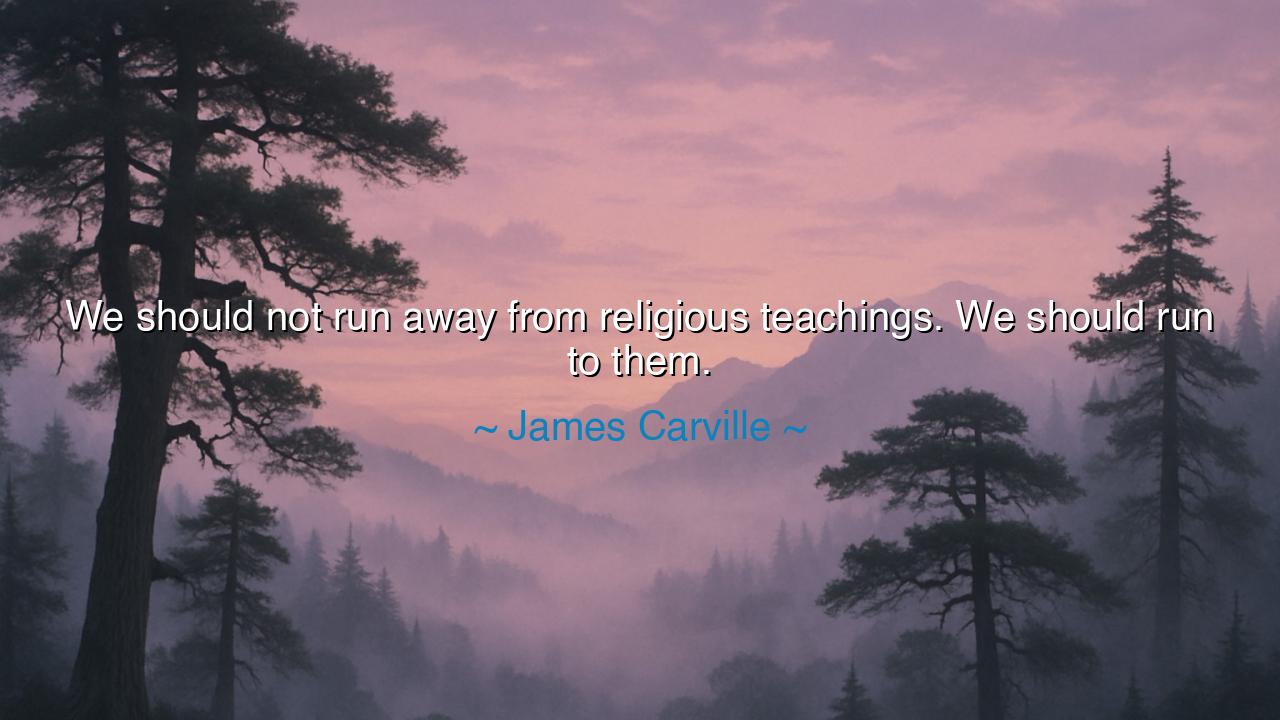
We should not run away from religious teachings. We should run






Hear the bold words of James Carville: “We should not run away from religious teachings. We should run to them.” At first glance, these words seem like the counsel of a political man speaking of faith, but beneath them lies an eternal summons. For in every age, there arises the temptation to cast aside the sacred, to flee from that which demands reverence, discipline, and humility. Yet Carville declares the opposite: that the wisdom of faith should not be shunned as a burden, but sought as a treasure. To run away is to escape into emptiness; to run to is to embrace the fountain that quenches the thirst of the soul.
The ancients knew this truth. When Moses descended from Sinai with the commandments in hand, the people trembled at the divine voice and begged to turn away. Yet those who endured, who did not run away but stood firm before the fire of God, were shaped into a nation. Likewise, when the Buddha first turned the wheel of Dharma, many resisted, fearing the renunciation he taught. But those who ran toward his words found freedom, compassion, and peace. In every faith, the pattern is the same: religious teachings are not chains meant to bind, but paths meant to guide. To flee is to remain lost; to embrace is to be led home.
Consider the life of Tolstoy, who in the brilliance of his youth sought meaning in fame, in war, in wealth. Yet the more he fled from the teachings of Christ, the more hollow he became. At last, broken in spirit, he returned to the Gospel he had scorned. There he found what eluded him elsewhere: a moral compass, a wellspring of truth, a reason to live simply and love deeply. His writings, born of this return, have touched countless lives. Had he continued to run away, the world might never have known his deeper wisdom.
To run to religious teachings is not to surrender one’s mind blindly, but to drink from wells dug by centuries of searching souls. In the Psalms, the weary find comfort. In the Bhagavad Gita, the doubting find duty and clarity. In the Qur’an, the seeker finds guidance and strength. These teachings endure because they carry within them the distilled essence of human longing for the divine. To reject them outright is to refuse the inheritance of countless generations who sought truth before us.
But let us be honest: many flee because religious teachings demand transformation. They call us to humility, to service, to repentance, to love of neighbor — all tasks more difficult than the selfish pursuit of comfort. The heart resists such commands, preferring to run away rather than face the mirror of the soul. Yet Carville urges us to reverse this instinct: do not recoil from correction, but embrace it; do not flee discipline, but cherish it. For only by confronting the sacred do we learn who we truly are.
The lesson, then, is clear: do not fear the call of the eternal. To run away is to remain forever restless. To run to the teachings of faith is to encounter the wisdom that transcends the ages, to find moral grounding in a world of shifting sands. Just as a ship requires a compass, so too does the soul require teachings that point toward truth, justice, and compassion. Without them, we drift; with them, we journey with purpose.
Practically, seek the sacred words of your tradition — read them, meditate upon them, discuss them with others. Let their guidance challenge your heart and refine your actions. Even if you are skeptical, approach them with curiosity rather than disdain, for within them lies the distilled wisdom of countless lives. Walk into temples, churches, mosques, or groves of stillness, not as a stranger fleeing in fear, but as a child returning home.
Thus, let Carville’s call echo in your soul: “We should not run away from religious teachings. We should run to them.” For to run to them is not to chain oneself, but to free oneself. It is to exchange confusion for clarity, despair for hope, and wandering for a path. Run, therefore, not from the sacred, but toward it — and in that embrace, find your truest self.






AAdministratorAdministrator
Welcome, honored guests. Please leave a comment, we will respond soon